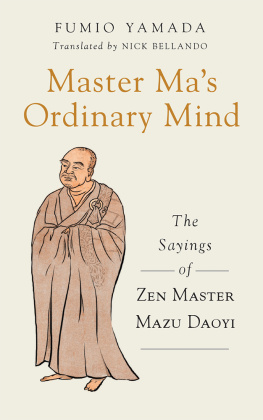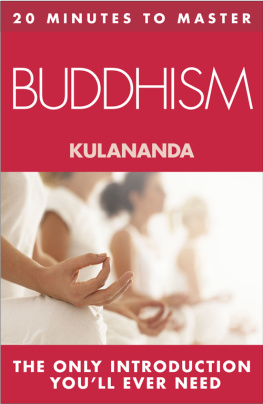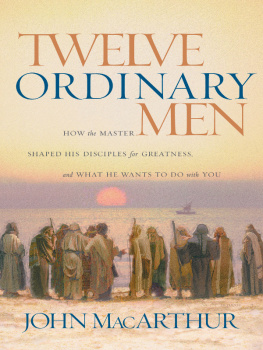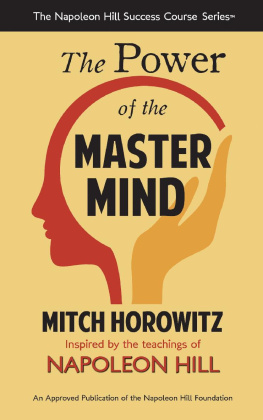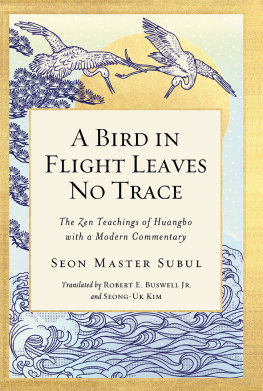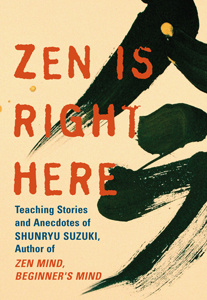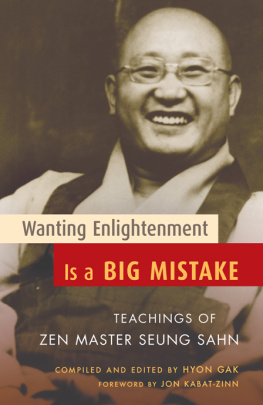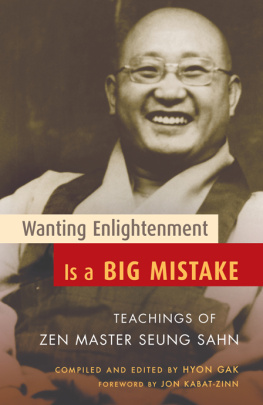
Translators Preface
Fumio Yamadas personality comes out in his writing. Hes the sort of person who gives you room to explore, room to fail, room to succeedroom to be yourself. Whether or not you agree with his interpretations or ideas is beside the point; his aim is to learn with you, not to teach you.
Fumio and I have spent many hours discussing Zen and related topics together, exploring old things and letting them become new. The conversation always takes on a life of its own, wandering off the path, and sometimes ending up somewhere altogether different. As you walk through this text, youll enjoy a similar dialogue. His own natural insight and sense of curiosity, coupled with his nearly forty years of working with Zen and classical Chinese, will bring out the human side of the sayings of Master Mazuwhich is often lacking in English-language literature on the subject.
It is precisely this human side that makes Mazu such an attractive figure. While mulling over his dialogues with Fumio, I discovered a side of Zen that hadnt been so explicit in collections Id read of other masters. Mazu isnt just about smacking people into reality and confounding them with riddles; instead, he speaks like someone who truly cares about the people who have been entrusted to him. He wants them to know that they are valuable just as they areand once they understand that, he wants them to go even further, breaking down every obstacle and hindrance so that their personality flourishes fully, so that they can be truly alive.
That life that Mazu wants to nurture is still present in the textwhich only really comes alive when you find yourself in it. Only then can the past contained in the text truly become present. In reading this book, you will come into conversation with both Mazu Daoyi and Dr. Yamadaand hopefully with yourself as well.
Overall, this translation was made with the attempt to preserve the vibrancy of the original Zen dialogues as well as the dynamic between them and Dr. Yamada. Zen history is one of endless and layered encounter, from the one between Bodhidharma and the first Chinese Zen disciples to the ones you will have with this very text. These are your encounters. Whether they bring laughter, joy, warmth, or bewilderment, above all, may they inspire and draw out the wondrously valuable life thats in you.
Nick Bellando
Authors Preface
I wanted to make a map that would serve to guide people through the world of Master Mazu.
Whether a map is actually useable or not depends on the scale you use. If you try to draw it in perfect detail, it ends up growing to a scale of 1:1. Such a life-size map can hardly be said to be useable; on the other hand, if you make it as general and undetailed as a standard desktop globe, it doesnt prove to be of much practical use either.
If you walk along through the world of Master Mazu, using my map as a guide, youll see all of the important sights without missing a thing. However, mine is not a conventional tourist map. When the popular sights dont seem very interesting, we simply pass them by. On the other hand, when we come to a place that I like, we take our sweet time, regardless of whether its actually deemed a sight or not.
While walking along with Mazu, for instance, Ill lead you on several detours to visit people like Nanquan and Zhaozhou. We take a little breather with these gentlemen, and before we know it Mazu will already be walking way up ahead of us, so we must scramble and stumble along to catch up.
Make no mistake: This is not meant to be an analytical, academic work. If you are looking for source criticism and historical analysis, there are plenty of other texts that address these issues very skillfully. This book contains the personal reflections of an ordinary personwritten for ordinary (and extraordinary) people.
My prayer is that, like a butterfly crossing the Sakhalin Strait, the words in this book will somehow reach the heart of the reader.
Fumio Yamada
Part I
Ordinary Life Is the Way
The Salt and Miso Are Not Lacking
Huairang, hearing that Mazu had begun teaching in the Jiangxi region, asked his disciples about it.
Is Daoyi really expounding the Dharma for the masses?
Indeed he is.
And no one came to tell me about it!
Huairang sent one of the monks to see Mazu, telling him to wait until Mazu entered the Dharma hall to deliver his Dharma talk and then to ask him simply, Hows it going? The monk was to remember whatever Mazu said in reply and then report back.
The monk went to see Mazu and did as he had been instructed. Mazu replied, Its been thirty years since my dubious start; at present, salt and miso are not lacking.
The monk returned to Huairang and reported what he had heard.
Huairang approved.
Mazus response that at present, salt and miso are not lacking is quite interesting; its perhaps as if hes saying, I started out without any idea of what I was getting into, but thanks to your training, Im not going hungry.
A rich lifestyle doesnt guarantee that youll have peace of mind; too many possessions tend to invite suffering. But salt and miso are basic staples, so it would be acceptable to read this as the common sentiment that the happiest life is that of honest poverty. However, considering Huairangs interest in his former student, there may be something a bit deeper going on in the details.
In his response, perhaps Mazu is simply revealing his mind: Im just living everyday life. To live without artificial problems is Zen itself. No need to say anything more.
I suppose a Zen priest would be expected to have such an attitude, but those in the secular world might not find it so easy. A teacher in the midst of the bustle of worldly life, concerned with helping a hard-working student to find a job, might be tempted to say something to the tune of this: Just live naturally is a nice ideal, but it wont put food on the table. You need to be practical. Settle for a desk job. But remembering Mazus words, he restrains himself, instead giving the following advice: Go for it! Set your sights high, follow your dreams. It may be tough at first, but go ahead and live out the life thats in you. Perhaps Mazus road to becoming a Zen master with his own temple wasnt easy, and thats what he calls his dubious start. Thirty years later, hes made ithes living his life to the fullest and hasnt failed to put food on the table.
A realized being seeks nothing, not even enlightenment. He or she can be completely satisfied with a simple diet of brown rice, miso soup, and vegetables. In Japan, this natural, no-problem way of being is popularly expressed in the Zen maxim byojo shin, kore michi nari, or ordinary mind is the Way. Most people dont realize it, but these words belong to Mazu Daoyi.
Keep Yourself Unstained
Theres no need to trouble yourself with mastering the Way. Its enough if you just take care to keep yourself unstained. We become stained by being overindulgent in life, fearing death, striving, and chasing after goals. If you want to grasp the Way directly, it is none other than your ordinary mind.
If you turn the Way into an object to be grasped, into a goal or a thing to be sought for, you end up having the opposite effect: contaminating the Way. So how do we keep from setting goals and seeking? In whatever you do, just live ordinary life, says Mazu.
So does this mean we can take ordinary mind is the Way at face value and just piddle on with our daily life? Not quite. That amounts to no more than a lazy sort of self-satisfaction.
The saying ordinary mind is the Way owes its fame to Mazu, but it is almost equally famous for its appearance in a dialogue that takes place between Nanquan, a disciple of Mazu, and his disciple Zhaozhou:
Next page
